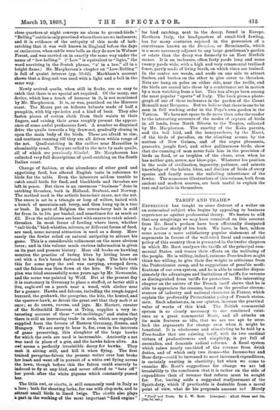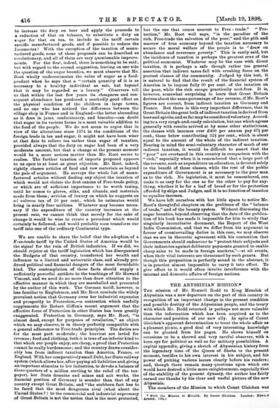TARIFF AND TRADE.* EXPERIENCE has taught us some distrust of
a writer on an economical subject who begins by appealing to business experience as against professorial theory. We hasten to add that any misgivings we may have conceived on this account from Mr. Root's preface have been effectually dissipated by a further study of his book. We have, in fact, seldom come across a more satisfactory popular statement of the arguments in favour of the well-tried fiscal and commercial policy of this country than is vesented in the twelve chapters in which Mr. Root analyses the tariffs of the principal com- mercial States, and traces their effects on the wellbeing of the people. He is willing, indeed, extreme Free-traders might think too willing, to give their due weight to criticisms from the Protectionist camp, and to suggestions of possible modi- fications of our own system, and he is able to consider dispas- sionately the advantages and limitations of tariffs for revenue as distinguished from tariffs for protection. His interesting chapter on the nature of the French tariff shows that he is able to appreciate the reasons, based on the peculiar circum- stances of iedustry and national character in France, which explain the profoundly Protectionist policy of French states- men. Such admissions, in our opinion, increase the practioil value of works of this kind. The Bgitish commercial system is so clearly necessary to our continued exist- ence as a great commercial State, and all attacks on its main features so idle, that we are too apt to over- look the arguments for change even when it might be beneficial. It is wholesome and stimulating to be told by a Free-trader that our existing tariff, with its two cardinal virtues of productiveness and simplicity, is yet full of anomalies, and demands radical reforms. A fiscal system which raises nearly one-third of the revenue from drink duties, and of which only two items—the Income-tax and Beer-duty—could be increased to meet increased expenditure, is certainly wanting in elasticity ; but when we come to examine Mr. Root's suggestions for change we are led irresistibly to the conclusion that it is rather on the side of expenditure than of revenue that reform must be sought for. For, leaving aside a suggested readjustment of the Spirit-duty, which if practicable is desirable from a moral point of view, what do his proposals amount to? Merely
• Tariff and Trade. By T. W. Root. Liverpool Allott J011011 11114 CO. [10s, 6d. not.j
to increase the duty on beer and apply the proceeds to a reduction of that on tobacco, to substitute a duty on sugar for that on tea, to include in the tariff certain specific manufactured goods, and if possible to reduce the Income-tax! With the exception of the taxation of manu-
factured goods, none of these proposals can be described as revolutionary, and all of them are very questionable improve. 'vents. For the first, indeed, there is something to be said ; but with regard to the second suggestion, leaving on one side the question of the sugar bounties, we must observe that Mr. Root wholly underestimates the value of sugar as a food- product when he says that a "certain quantity of it is as necessary to a healthy individual as salt, but beyond that it may be regarded as a luxury." Observers tell us that within the last few years its cheapness and con- sequent abundance has produced a markedly good effect on the physical condition of the children in large towns, and no one who has noticed the difference between the village shop in France and in England—the latter abounding as it does in jams, confectionery, and biscuits—can doubt that sugar in its various forms is a most valuable addition to the food of the people. We do not mean to argue that in view of the alterations since 1874 in the conditions of the foreign trade in tea and sugar, it might not have been wiser at that date to relieve tea rather than sugar of taxation, provided always that the duty on sugar had been of a very moderate amount, but that a change at the present moment would be a more serious matter than Mr. Root seems to realise. The further taxation of imports proposed appears to us open to at least as great objection. Mr. Root, indeed, rightly classes articles of food and raw materials as beyond the pale of argument. He surveys the whole list of manu- factured articles without finding any object the taxation of which would not violate the first canons of Free-trade policy, or which are of sufficient importance to be worth taxing, until he comes to gloves, silks, and ribands, and materials made from them ; articles of luxury on which he suggests an a.l valorem tax of 20 per cent, which he estimates would bring in nearly four millions. Whatever may become neces- sary if the expenditure of the country increases at the present rate, we cannot think that merely for the sake of change it would be wise to create a precedent which would certainly be followed, and would probably soon transform our tariff into one of the ordinary Continental type.
We are unable to share the belief that the adoption of a Free-trade tariff by the United States of America would be the signal for the ruin of British industries. If we did, we should rejoice at the tariff legislation which has disorganised the Budgets of that country, transferred her wealth and influence to a limited and autocratic class, and already pro- duced political and financial dangers of the most formidable kind. The contemplation of these facts should supply a sufficiently powerful antidote to the teachings of Sir Howard Vincent, and we need do no more than draw attention to the effective manner in which they are marshalled and presented by the author of this work. The German tariff, however, is leas familiar to Englishmen, and Mr. Root combats the widely prevalent notion that Germany owes her industrial expansion and prosperity to Protection,—a contention which usefully supplements Sir Robert Giffen's recent argument that the effective force of Protection in other States has been greatly exaggerated. Protection in Germany, says Mr. Root, "is almost dead, except for purposes of retaliation," an object which we may observe, is in theory perfectly compatible with a general adherence to Free-trade principles. The duties are for the most part moderate; the heaviest are levied for revenue; food and clothing, both it is true of an inferior kind to that which our people enjoy, are cheap, a proof that Protection cannot be really burdensome ; and the country draws consider- ably less from indirect taxation than America, France, or England. With her comparatively small Debt, her State railway system (which allows her, after paying all liabilities and giving an important stimulus to her industries, to devote a balance of three-quarters of a million sterling to the relief of the tax- payer), her State domains and mines and salt works, the _financial position of Germany is sounder than that of any country except Great Britain, and "the stubborn fact has to be faced that the most dangerous rival (what about the United States ? ) to the commercial and industrial supremacy of Great Britain is not the nation that is the most protected,
but the one that comes nearest to Free - trade." "Pro- tection," Mr. Root well says, " is the paradise of the rich, Free-trade the salvation of the poor," and the pith and marrow of true economy beyond the taxation necessary to secure the moral welfare of the people is to "draw on abundance and reverence poverty." This is easily said, but the incidence of taxation is perhaps the greatest crux of the political economist. Whatever may be the case with direct taxation, it is perhaps a safe though rather too general assertion that indirect taxes fall with crushing force on the poorest classes of the community. Judged by this test, it is natural to find that the result of the financial system of America is to impose fully 90 per cent. of the taxation on the poor, while the rich escape practically scot-free. It is, however, somewhat surprising to learn that Great Britain derives about the same percentage of her revenue, if Mr. Root's figures are correct, from indirect taxation as Germany and France. But there is this very important difference, that in Great Britain the great bulk of indirect taxation is derived from beerand spirits, and so far may be considered voluntary. Accord- ing to a very rough-and-ready calculation, but one which agrees generally with results arrived at by some other statisticians, the classes with incomes over 2400 per annum pay 47i per cent., those below contributing 52i per cent., which is about equal to the amount of the whole of the indirect taxation. Bearing in mind the semi-voluntary character of much of our indirect taxation, it would be difficult to assert that the " poor" are overtaxed in this country in comparison with the 'rich," especially when it is remembered that a large part of the revenue, such as expenditure on education, is devoted solely to the benefit of those classes, while the rest of the public expenditure of Government is as necessary to the poor man as to the rich. No legislation, it must be remembered, can make it as easy for the one as for the other to pay for any- thing, whether it be for a loaf of bread or for the protection afforded by ships and Judges, and it is no function of taxation to equalise incomes.
We have left ourselves with but little space to notice Mr. Root's thoughtful chapters on the problems of the "balance of trade," and of the bounty system. Without discussing the sugar bounties, beyond observing that the date of the publica- tion of his book has made it impossible for him to study that singularly inconclusive document, the Report of the West India Commission, and that we differ from his argument in favour of countervailing duties in this case, we may observe that we are in theoretic agreement with his contention that Governments should endeavour to "protect their subjects and their industries against deliberate payments granted to enable cheap sales to be made in foreign markets,"—at all events, when their vital interests are threatened by such grants. But though this proposition is perfectly sound in the abstract, it is in practice almost impossible to carry it into effect. To give effect to it would often involve interference with the internal and domestic affairs of foreign nations.







































 Previous page
Previous page